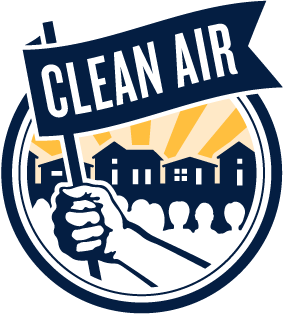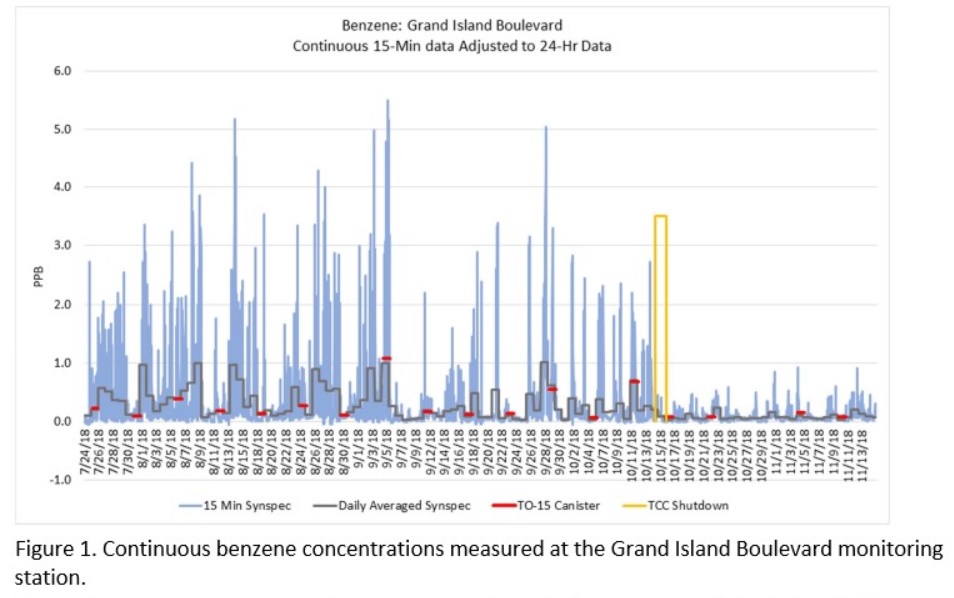Tonawanda
Click here to read a statement from Liv Yoon the filmmaker!
Clean Air’s work began in the early 2000s with living room conversations between neighbors in Tonawanda about ongoing health issues and the possible links to industrial polluters. Our work continues today with our River Road Watchdog Team, which focuses on clean up processes at former industrial sites as well as oversight of current industries, and with the Tonawanda Tomorrow Team, which focuses on equitable development throughout the Tonawandas.
Read more about the history of our organizing in the Tonawandas below, and sign up to join our Tonawanda Tomorrow and our River Road Watchdog teams.
Tonawanda Coke
Clean Air’s first campaign was to lead a resident driven campaign against Tonawanda Coke, a coke manufacturing company that was identified as a bad actor through sound data. Clean Air members led a direct-action campaign to hold Tonawanda Coke responsible. Coalition members wrote to and met with and received the support of many elected officials, held a protest at the gates of the company and flooded the phone lines of government agencies that provided public subsidies to Tonawanda Coke.
The media coverage and public pressure generated by members has resulted in real change. In December of 2009, the US Department of Justice, the US EPA, NYS DEC and US Coast Guard raided Tonawanda Coke with a federal search warrant.
Less than a week later, Mark Kamholz, Tonawanda Coke’s Environmental Control Manager, was arrested.
Clean Air’s campaign resulted in an EPA enforcement action and criminal trial. Tonawanda Coke was found guilty in March 2013 of breaking 14 federal laws under the Clean Air Act and the Resource Conservation and Recovery Act. Mark Kamholz was found guilty on the same counts and an additional count of obstruction of justice.
Since the EPA’s enforcement action, there was a reported 92% reduction in benzene from the continuous air monitor at Grand Island Blvd. and a 68% reduction at the air monitor on Brookside Terrace (see more at DEC Tonawanda Air Study) The company was fined $12.5 million in fines, received five years of probation, and had to pay nearly 12 million for future health and environmental studies. Mark Kamholz was sentenced to one year and one day in prison and fined $20,000 and received a supervised release after serving the term.
In May 2018, Clean Air was confidentially notified that a waste heat tunnel at Tonawanda Coke collapsed, and publicly called on the DEC to examine potential toxic emissions being released into the surrounding community. One of the main chemicals of concern is benzene, a known human carcinogen. Clean Air members documented black smoke coming from the facility, and submitted hundreds of complaints to the DEC, drawing further attention to the gravity of the situation. In July 2018, DEC inspections at Tonawanda Coke revealed 176 violations of environmental regulations, and a cease and desist letter was issued. Clean Air organized two public meetings for residents to learn more about the DEC’s order.
When court proceedings began in September 2018, Clean Air members filled the court chambers for two weeks. In October, Tonawanda Coke revealed that it would close and reorganize under Chapter 11 bankruptcy. The day of the announcement, Clean Air called on New York State to assist in the transition of workers. The next day, the NYS Department of Labor’s rapid response team visited the plant, contacted worked and held two workshops for workers to access services and link to employers.
As a result of the shutdown, benzene posed a 75 in 1 million lifetime cancer risk in neighborhoods in the Town and City of Tonawanda in 2008, that risk dropped to 7 in 1 million.
But there’s more work to be done. Concerns on the site include chemical moats, coal tar, an ammonia liquor and light oil that mostly consists of benzene as well as toluene and xylene. Given the amount of contamination, disturbing the grounds for clean up itself raises questions and concerns for residents, such as worries voiced about dust when the smoke stacks were demolished. Clean Air will continue to hold Tonawanda Coke accountable, advocate for the strongest standards during clean up, and pressure the state and federal government to move forward safely and swiftly with remediation. Click here to join our River Road Watchdog Team.
Just Transition – NRG Huntley
In 2016, the 100-year-old NRG Huntley coal burning power plant, the county’s largest polluter, retired. Two years before, Clean Air began leading a broad coalition to organize for a Just Transition of the facility in a way that provides family sustaining jobs and consistent tax revenue, while improving the environment and public health.
Clean Air and our partners successfully secured the United State’s first state transition fund for energy plant retirements. In addition, we collaborated with partners to create the town’s economic transition plan, called Tonawanda Tomorrow, to provide a pathway for the town to recoup lost revenue and improve waterfront access. The plan was shaped by the voices of nearly 1,000 Tonawanda residents, business owners, and community stakeholders. The full plan can be downloaded by clicking here.
In 2018, Clean Air took a leading role on the Implementation Team putting the Tonawanda Tomorrow plan into action. A key aspect of the plan is ensuring the soil on the Huntley site is tested to adequately determine the level of toxicity, and the safe draining and removal of the ash ponds, which sit near the edge of the Niagara River. These are the first steps to determining how the site can be remediated and repurposed, as is establishing overlaying equitable development processes, like requiring Community Benefit Agreements with any state or municipal funding. Join our Tonawanda Tomorrow Team by clicking here.
You can also keep up to date on our campaigns in Tonawanda and throughout the region by visiting our blog, following our social media (Facebook, Twitter and Instagram), or by signing up for our monthly email newsletter. Click here to become a member.
Other Useful Pages

